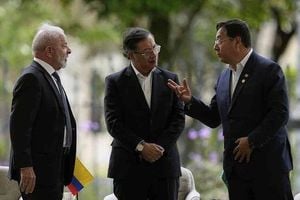On August 21, 2025, the state of U.S.-India relations took center stage following pointed remarks by John Bolton, former National Security Adviser under President Donald Trump. In a candid interview with the Hindustan Times, Bolton did not mince words, describing current U.S. policy toward India as “very confused,” and warning that the bilateral relationship is, for now, “in a very bad place.” His comments come at a moment of heightened tension, as India faces a 25% penalty for its purchase of Russian energy—a move that has not been mirrored in the cases of China or Russia, both of whom are also major purchasers of Russian oil and gas.
Bolton’s critique of the Trump administration’s approach to India was sharp and direct. He questioned the logic behind singling out India for punitive tariffs while allowing China to proceed without similar consequences. “It turns out that Russia has not faced any new sanctions. China has not faced any new sanctions, notwithstanding the fact that they were the major purchasers of Russian oil and gas. India has been singled out,” Bolton told Hindustan Times. He went further, suggesting that such actions risk pushing India closer to both Russia and China—an outcome that could have significant implications for global geopolitics.
The roots of the current impasse stretch back to April 2025, when the so-called Liberation Day tariffs were suddenly imposed by President Trump. According to Bolton, Indian negotiators were actively working toward a mutually agreeable solution when Trump abruptly announced a 25% tariff, catching many off guard. Later, an additional 25% penalty was tacked on, specifically targeting India’s continued purchase of Russian oil and gas. “Well, I think it’s unfortunately very confused,” Bolton said, summarizing the prevailing sentiment among observers on both sides of the Pacific.
Bolton’s assessment of the Trump presidency was equally unvarnished. He called Trump an “aberrational president,” emphasizing that his actions do not reflect a consistent philosophy or legacy that would outlast his tenure. “Trump doesn’t have a philosophy, so there’s no legacy for his successors. Our objective should be to keep the damage to the relationship at a minimum, and then think about how to repair it quickly thereafter. When Trump leaves, he’ll take almost the bulk of this history with him,” Bolton remarked. This, he suggested, leaves the door open for a reset in U.S.-India ties once the current administration departs.
The interview also shed light on the criticism leveled by U.S. Treasury Secretary Scott Bessent, who has taken a hard line against India’s energy dealings with Russia. Bolton, however, dismissed Bessent’s experience in international affairs and pointed out inconsistencies in the sanctions regime. “Secretary Bessent isn’t very experienced in international affairs, and I don’t think he sees the growing axis between China and Russia,” Bolton observed. He explained that the sanctions, as written, do not actually prohibit India from buying Russian oil at or below $60 per barrel and reselling it elsewhere. “If that’s the complaint, the complaint lies with the sanctions, not so much with India’s behaviour. What India did isn’t prohibited,” he clarified.
For many in India, the abrupt imposition of tariffs and the apparent double standard in U.S. policy have raised uncomfortable questions about the reliability of Washington as a strategic partner. Bolton acknowledged these concerns, stating, “Unfortunately, what Trump has done on tariffs is destroying decades of effort with India and many others to build up good faith and reliance, and it will take time to repair that.” The sense of betrayal, he implied, runs deep and will require more than diplomatic platitudes to overcome.
Bolton’s comments also touched on the broader context of U.S.-China relations. He described Trump’s policy toward China as similarly muddled, noting that while Trump once sought “the biggest trade deal in history” with Beijing, he ultimately extended tariff deadlines and refrained from imposing secondary sanctions on China for its own purchases of Russian oil and gas. “If you want a trade war, we should have teamed up and had a trade war with China, because they’re the worst actor in international economics. They steal intellectual property, subsidise companies, don’t open their market even when they claim to. It’s hard to explain why he gives China this much leeway,” Bolton said, highlighting the inconsistency at the heart of recent U.S. foreign policy.
Despite the current turbulence, Bolton sees a path forward—albeit a challenging one. He suggested that Indian Prime Minister Narendra Modi should look for the right moment, perhaps during the upcoming UN General Assembly in New York in September 2025, to meet with Trump directly and “clear the air.” Bolton believes that the personal rapport between Trump and Modi, which existed prior to the tariff dispute, remains a valuable asset. “Before the tariff problem, Trump and Modi had a good personal relationship, which is central to Trump’s view of state-to-state relations. That asset remains, and if deployed effectively, could be a step toward recovery,” he advised.
Bolton’s remarks have resonated widely among diplomats, analysts, and policymakers, both in Washington and New Delhi. Many agree that the current moment represents a low point in a relationship that has, over the past several decades, grown steadily deeper and more multifaceted. The imposition of tariffs, the apparent singling out of India for punitive measures, and the lack of a clear, coherent U.S. strategy have all contributed to a sense of uncertainty and mistrust.
Yet, as Bolton pointed out, the damage is not necessarily permanent. The absence of a guiding philosophy in the Trump administration’s approach means that future leaders have the opportunity to reset the tone and substance of the bilateral relationship. In the meantime, Bolton urged continued dialogue between non-governmental actors in both countries to ensure that the actions of those at the top do not define the entire relationship. “We need continued conversations between non-governmental Indians and Americans, so people see that what’s happening at the top isn’t reflective of what the whole country thinks,” he said.
For now, the U.S.-India relationship stands at a crossroads, buffeted by policy confusion, diplomatic slights, and competing global interests. Whether the two countries can find their way back to a more stable and mutually beneficial partnership remains to be seen. What is clear, however, is that the road to recovery will require patience, candor, and a willingness to move beyond the “aberrational” moments of the recent past.
As the world watches, the choices made in the coming months—by leaders in Washington and New Delhi alike—will shape the trajectory of this vital partnership for years to come.



